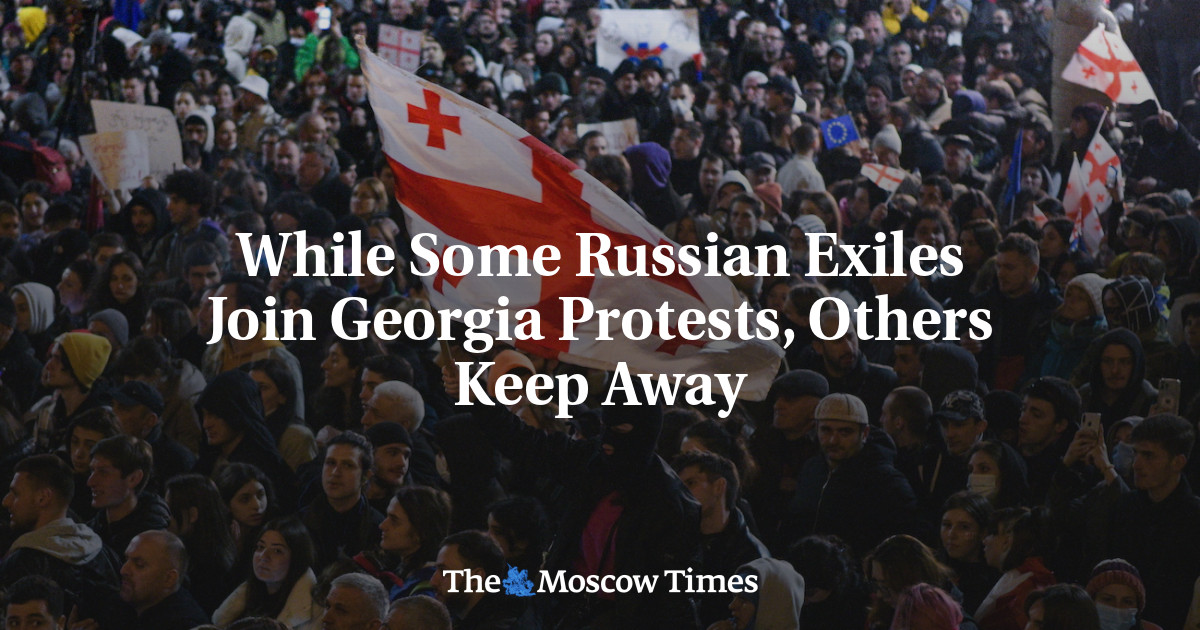
When thousands of Georgians protested this week to demand a bill similar to controversial Kremlin legislation be scrapped, some Russian exiles joined rallies that would have been unthinkable in their homeland.
Viktor Lyagushkin, 52, is one of tens of thousands of Russians who fled to Georgia in the aftermath of Moscow’s invasion of Ukraine last year.
He joined the mass protests in Tbilisi that erupted after parliament gave initial backing to a bill on “foreign agents” reminiscent of Russian legislation used to suppress Kremlin critics.
Lyagushkin said “many” Russians but also Ukrainians had joined several days of the anti-government protests in Tbilisi this week.
“The possibility of going out and expressing disagreement is important for them because that’s what they were deprived of in Russia,” he said.
The legislation was dropped after three days of youth-led protests and an outcry from the West.
“I decided to participate because I am not indifferent to the fate of Georgia,” Lyagushkin added.
“I have many Georgian friends and I wanted to support them,” said the National Geographic photographer, dressed in yellow-and-blue clothes in the colours of the Ukrainian flag.
Lyagushkin used to live between Moscow, Kyiv, and Tbilisi before settling in Georgia after the Kremlin unleashed an all-out war on Ukraine in 2022.
‘I had to show support’
Since President Vladimir Putin sent troops into Ukraine, Russian authorities have ramped up a crackdown on dissent, jailing opposition activists or forcing them into exile.
Since the beginning of the war, thousands of cases were opened against Russians for “discrediting” Moscow’s army and some people were jailed.
Lyagushkin said he did not think that a popular opposition movement similar to what he has seen in Georgia could emerge in Russia.
He likened the protests in Georgia to a popular uprising in Kyiv that ousted Kremlin-friendly leaders from power in 2014, sparking a confrontation with Russia.
Bogdana Vashchenko, a Ukrainian who lived in Moscow for more than a decade, could not agree more.
The 46-year-old writer and journalist, who now lives in Tbilisi, took part in protests in the South Caucasus country together with Lyagushkin.
“As a Ukrainian and a human, I knew I had to show support for Georgia and my Georgian friends,” she told AFP.
Vashchenko said “the lies” of the Georgian ruling party were similar to those of Ukraine’s pro-Russian President Viktor Yanukovych, who was ousted in 2014.
“It’s as if they had the same agenda, the same plan,” she said.
‘Nothing will change’
But some Russian exiles here have other issues on their mind and seem indifferent to the recent political turmoil.
In bars and cafés just a few streets from where protests had taken place outside parliament, their conversations on Friday night centred around rising electricity prices, immigration prospects, and memories of their homeland.
Vladimir Kirsanov, who is in his thirties, arrived in Georgia in September after Putin announced a military mobilization. He now wants to move to Argentina together with his partner Margarita, but they are not sure they can afford the move.
“Nothing will change in Russia for the next 10 years,” said Kirsanov, adding that he had no interest in meddling in Georgia’s affairs.
He also does not want to have problems with law enforcement in Georgia, where he has to stay for at least six months to be able to apply for a Schengen visa.
The Georgian authorities have recently come under criticism from rights groups and the opposition for barring some Kremlin critics from entering the country. Some observers have warned of the authorities’ dangerous drift towards Moscow.
Vashchenko sees the Russian people’s political apathy as the “root of evil” that bedevils the country.
She said it was important to stand by Georgia, which fought a five-day war with Russia in 2008. And a new war between Russia and Georgia could not be ruled out, she added.
“Yes, we are afraid, and I think Georgians are also afraid of the possibility of an invasion,” she said.
“But if we stay home in fear, then they will definitely come.”
Leave a Reply